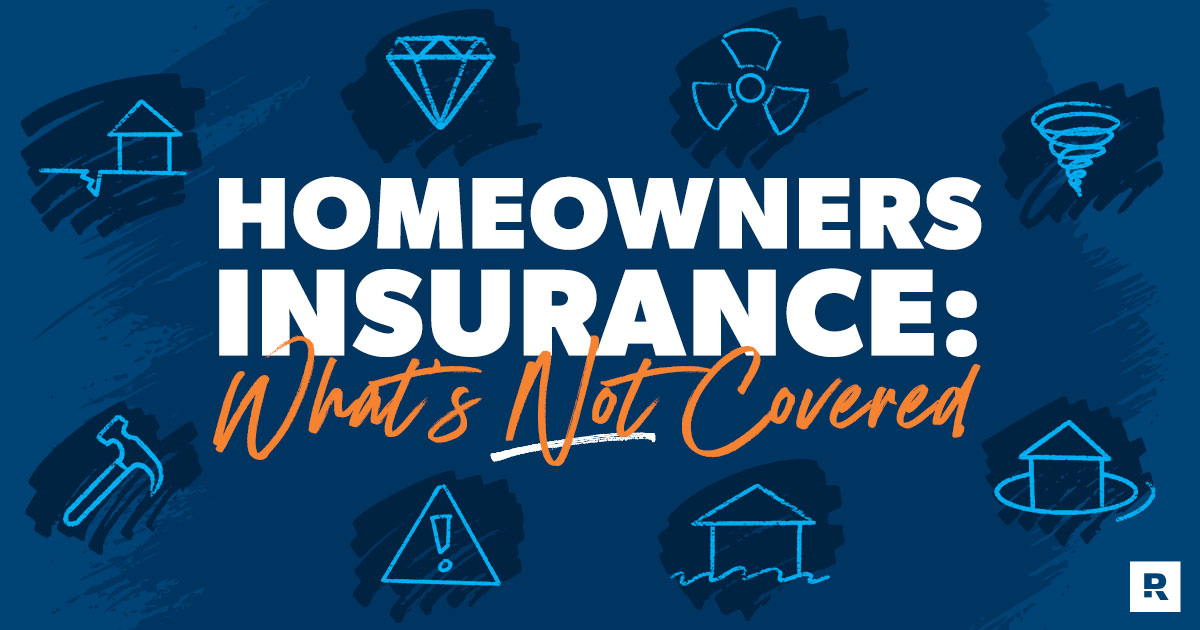What’s Not Covered by Homeowners Insurance?
7 Min Read | Nov 21, 2023

When it comes to homeowners insurance, there are a ton of myths floating around about what is and isn’t covered. And this misinformation can leave people assuming they’re protected when they’re actually not. This causes real issues if a natural disaster that’s not covered by your insurance company damages your house.
Home repairs can be devastating. Don’t let lack of knowledge prevent you from getting the right coverage.
We’ll break down all the things that aren’t covered by standard homeowners insurance policies so you can protect your biggest investment.
What Is Homeowners Insurance?
Homeowners insurance is a way to transfer risk to an insurance company in the event your house needs to be repaired or rebuilt. It provides financial protection for your home and personal belongings in the case of accidents, fires or other disasters. Home insurance also covers you from expensive lawsuits due to accidents on your property.
Most mortgage companies require you to have homeowners insurance. Even if you rent, many landlords require you to have renters insurance to protect your stuff.
What Does Homeowners Insurance Not Cover?
There are a bunch of things homeowners insurance does cover—things like dwelling coverage, personal liability and personal property. But what doesn’t it cover? And when should you consider buying additional coverage?
Here’s a list of what’s not covered by a basic homeowners insurance policy.
Flooding
Everybody wants to be near the water—until there’s a flood! Most homeowners don’t think about disasters like floods and earthquakes when calculating their homeowners insurance needs.1 In fact, 90% of natural disasters in America involve flooding—but only 27% of homeowners say they have flood insurance.2,3 And the National Flood Insurance Program—the government-run place to buy flood insurance—believes this percentage is actually on the low end. This is because a lot of people assume they have flood protection but don’t.
If you’re wondering which area is not protected by most homeowners insurance policies, a big one is designated flood zones. Standard home insurance policies won’t cover flood damage. Consider yourself warned.
If you live in a flood zone, or are at a higher risk for flooding, you need flood insurance. It pays for damage to your house’s structure and anything attached to it, like your HVAC system or kitchen appliances. But it doesn’t always pay for your belongings. You’ll need to replace those out of pocket, or you can ask your insurance agent about getting extra coverage.
We’ll say it again. If you live in a flood zone, don’t put this off. This is one area where procrastination can really cost you. Get flood insurance before the waters start rising.
Hurricanes
If you live in a coastal state that regularly gets hit by hurricanes, standard dwelling coverage won’t cover wind or flooding damage. You’ll need separate wind and hurricane policies for that.
Without wind insurance or a separate hurricane deductible, you might be looking at a lot of out-of-pocket costs if your home is damaged from a hurricane. You might be able to qualify for some help from the Federal Emergency Management Agency (FEMA), but don’t count on it. Instead, get the right insurance.
Earthquakes
From cracks in the walls to a damaged foundation, earthquakes can cause serious problems for your home—and your budget. And unfortunately, basic homeowners insurance won’t help. (The one exception is house fires that are caused by earthquakes. These are usually covered.)
If you live in an area where earthquakes can shake things up, you should look into adding earthquake insurance. It will cover structural repairs to your house (but not outdoor cosmetic repairs or other structures). You can also add coverage for personal property.
Sinkholes
“Hey honey, our house just fell into a sinkhole . . .” What?! While this is pretty unlikely, it does happen. And most homeowners policies won’t cover sinkholes—unless you live in Tennessee or Florida. Insurers in these two states are required to offer optional sinkhole protection.
Protect your home and your budget with the right coverage!
Consider adding this coverage if you live in one of the states where sinkholes are common—Tennessee, Florida, Alabama, Kentucky, Missouri, Texas and Pennsylvania.4
Sinkhole policies vary in what they cover—everything from your home to other structures to the ground itself—so work with your insurance agent to see exactly how much homeowners insurance you need.
Maintenance Issues
What do termites, mold, burst water pipes and sewage backups have in common? In most cases, your homeowners insurance doesn’t cover this kind of damage. You might be thinking, What?! But those are super expensive!
That’s true, but they’re also part of owning a home. Just like your car insurance coverage won’t pay for oil changes, your homeowners insurance company won’t pay to maintain your house.
So what do you do when this stuff happens? Well, two things.
First, stay up on your home maintenance and take care of small issues before they get big! Taking small steps to keep your pipes warm during frigid winters and making sure your home is properly ventilated can keep you from footing hefty repair bills. Also, if a tree branch falls on your roof, your homeowners insurance won’t cover the repairs since you could have prevented it by trimming it.
You should also save up an emergency fund so you’ve got the cash to cover stuff that breaks.
The next step—this will sound weird, but hang with us—is to get out of debt! Think about how much money you give away every month to pay for your student loans, your credit cards, your car . . .
Now imagine—what if instead of giving that money away, you got to keep it? Once you pay off your debt, you can save a fully funded emergency fund of three to six months of expenses. That’s plenty of money to handle home repairs!
Do You Have the Right Insurance?
Find out what insurance coverage you should add, tweak or drop based on your individual needs.
Certain Types of Property
Most homeowners insurance companies also won’t cover liability for certain kinds of higher-risk pieces of property. So if you own a trampoline, and your kid breaks his leg, insurance won’t cover those bills. Other items that usually fall into this category are diving boards, tree houses and big, aggressive dog breeds (think pit bulls).
War or Nuclear Hazard
Since we’re on the subject of bad things that could happen, we can’t leave damage from war or nuclear hazard off the list. (I bet you didn’t think you’d be reading about nuclear winter in a homeowners insurance article—but here we are!) A typical home insurance plan won’t cover you in the event your home is damaged or destroyed in a war or conflict. This also includes damage from nuclear accidents or from government seizure of your property (like eminent domain). However, your homeowners insurance policy will cover you in the case of terrorist attacks.
Expensive Art, Jewelry or Other High-End Items
If you own a Picasso or the Hope Diamond, sorry, but your standard homeowners policy won’t pay to replace those. (Plus, the value of the Hope Diamond is listed as “inestimable.” So there’s that problem too.) But in all seriousness, if you own expensive jewelry, art, antiques or other items, you need to boost your coverage to make sure those things are insured.
How to Make Sure You’re Covered
Okay, that was a lot of bad stuff. But you hung in there! Chances are, most of these things probably won’t happen to you. But a few of them might. And the last thing you want is to be vulnerable to financial disaster when Murphy strikes. You’ve worked too hard to let one bad incident wipe you out. And here’s the good news. You can purchase extra coverage for some of these not-covered events to make sure your home and finances are protected.
We recommend working with one of our insurance agents who is part of our Endorsed Local Providers (ELP) program. They are RamseyTrusted and can take a look—for free—at your situation to see how much homeowners insurance you need.
Connect with an ELP today to get the right coverage.
Interested in learning more about homeowners insurance?
Sign up to receive helpful guidance and tools.


